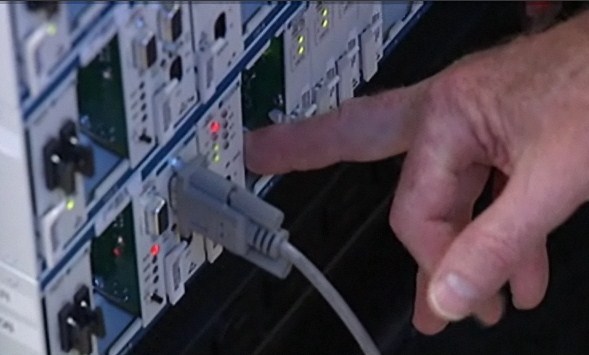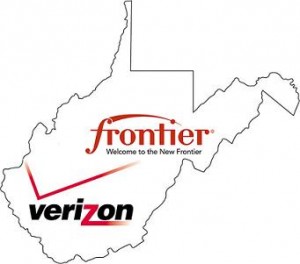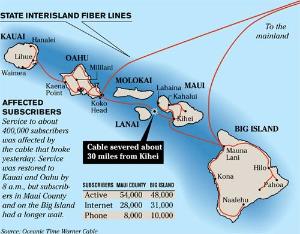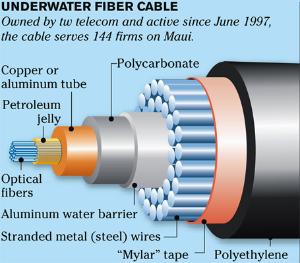 Qwest’s head of financial matters told Bloomberg News the company’s decision to sell out to CenturyLink made good financial sense because the telecommunications industry needs more industry consolidation.
Qwest’s head of financial matters told Bloomberg News the company’s decision to sell out to CenturyLink made good financial sense because the telecommunications industry needs more industry consolidation.
Chief Financial Officer Joe Euteneuer said the time was right for Qwest to sell operations in the north-central and mountain west region because there were too many competitors in the marketplace. Euteneuer said the telecommunications market needs to resemble the cable-TV business, which has been heavily concentrated into two huge powerhouses — Comcast and Time Warner Cable.
Qwest’s merger with independent telephone company CenturyLink continues the consolidation underway among independent phone companies not affiliated with AT&T or Verizon Communications. The merged entity will challenge Frontier Communications’ position in the landline marketplace. Regulators in Qwest’s service area have been giving cursory review of the proposed merger and the company expects few problems in getting the merger deal approved in every state affected.
The merged entity, tentatively to be called CenturyLink, has been spending most of its public relations efforts talking up the reshuffling of its management and executive office operations.
CenturyLink is promoting executives to new regional management positions the company unveiled Friday. CenturyLink’s new regional structure:
- Eastern, headquarters in Wake Forest: President Todd Schafer, current president of Century Link’s Mid-Atlantic region. Member states are Georgia, New Jersey, North Carolina, Ohio, Pennsylvania, South Carolina, Tennessee and Virginia.
- Midwest, headquarters in Minneapolis: President Duane Ring, current president of CenturyLink’s Northeast region; Illinois, Indiana, Iowa, Michigan, Minnesota, Nebraska, North Dakota, South Dakota, Wisconsin.
- Mountain, headquarters in Denver: President Kenny Wyatt, current president of CenturyLink’s South Central region; Colorado, Montana, Utah, Wyoming.
- Southern, headquarters in Orlando: President Dana Chase, current president of CenturyLink’s Southern region; Alabama, Arkansas, Florida, Kansas, Louisiana; Mississippi, Missouri, Oklahoma, Texas.
- Northwest, headquarters in Seattle: President Brian Stading, current vice president of network operations and engineering for Qwest; California, Idaho, Oregon, Washington.
- Southwest, headquarters in Phoenix: President Terry Beeler, current president of CenturyLink’s Western region; Arizona, New Mexico, Nevada.
For both companies’ tens of thousands of employees, there is some trepidation about “cost savings” (translation: job losses) that are also expected from this deal.
In Nebraska, more than one thousand employees remain unsure whether they’ll still have jobs after the merger.
Qwest’s president for Nebraska operations, Rex Fisher, is not waiting around to find out. He’s leaving, saying CenturyLink’s plan to restructure management roles “weren’t opportunities I was interested in,” the 53-year-old executive said.
A Qwest spokeswoman told the Omaha World-Herald the change in itself will have minimal immediate impact on the workforce level in Omaha.
Joanna Hjelmeland told the newspaper specific changes for Omaha’s workforce will “become more clear down the road,” Hjelmeland said.
“We are combining two companies, and in some instances there are going to be redundancies,” she said. “Eventually there are going to be job reductions as a result of the merger.”
[flv width=”512″ height=”404″]http://www.phillipdampier.com/video/WKBT La Crosse WI CenturyLink moving regional headquarters out of La Crosse 12-1-10.flv[/flv]
WKBT-TV in La Crosse, Wis., reports the city is going to lose Qwest’s regional headquarters, formerly located in La Crosse, as part of the merger shuffle. (1 minute)
Brian Stading, current vice president of customer operations for Qwest in Denver, is now preparing to relocate to head the regional office in Seattle. He outlined some of the changes expected to impact Qwest/CenturyLink customers in the region.
“I think you’ll see the continued focus on providing the highest quality service at the best possible price, both from a local phone service as well as from a high-speed Internet perspective and you’ll see a continued emphasis on expanding our broadband capability both in the city as well as in regional areas,” Stading told the Puget Sound Business Journal.
 Stading claims the company will be refocusing efforts to improve the reliability of its core business – landline service, and make incremental upgrades to broadband capability and speed.
Stading claims the company will be refocusing efforts to improve the reliability of its core business – landline service, and make incremental upgrades to broadband capability and speed.
“A lot of that does overlap with our high-speed broad deployment because any time we have the opportunity to go put in new fiber lines, it just provides additional quality throughout our backbone networks, so the two really do go hand in hand, both the expansion as well as the continued emphasis on reliability,” Stading said.
But there is every indication Stading is referring to middle-mile fiber infrastructure — cable that runs between telephone company central office facilities, and not to individual customer homes. CenturyLink, like Qwest, relies almost exclusively on DSL service delivered over standard telephone lines for broadband services. Qwest has also been deploying ADSL 2+ technology, a more advanced form of traditional DSL, in some areas in the Pacific Northwest and mountain west region. But many Qwest customers have no access to broadband at all, because of the remote areas the phone company serves in many states.
[flv width=”640″ height=”500″]http://www.phillipdampier.com/video/Bloomberg Qwest’s Euteneuer Says Industry Consolidation Was Needed 11-18-10.flv[/flv]
Bloomberg News talks to Joe Euteneuer, Qwest’s CFO about why Qwest merged with CenturyLink. (4 minutes)


 Subscribe
Subscribe














